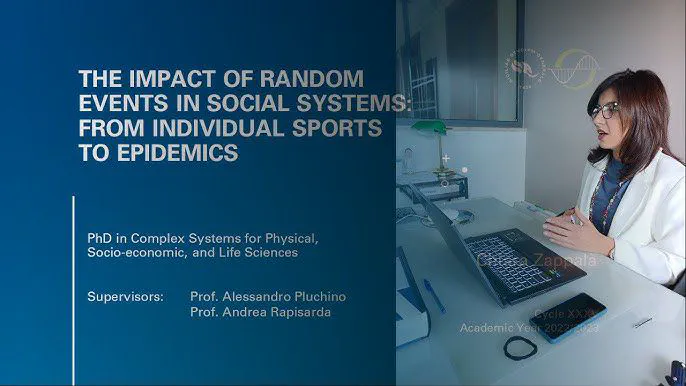My PhD defence
Online
On May 2 at 5pm, I will defend my PhD thesis titled “The impact of random events in social systems: from individual sports to epidemics”. Join online!
Title The impact of random events in social systems: from individual sports to epidemics
Abstract The study of social systems within the framework of complexity science is widespread. Among all the phenomena one could examine, the “rich-get-richer” phenomenon, also known as the “Matthew effect”, is particularly relevant since it is essential to understand the social dynamics of inequality in general. Specifically, the rich-get-richer phenomenon lies at the origin of success. Investigating what leads to success has recently received lots of attention because it concerns a variety of social systems. Despite the growing literature about the topic, little attention has been given to success in sports. Moreover, the role chance might play in achieving success has been rarely considered. In this thesis, we untangle the effects of random events and individual abilities in two sports, focusing on the dynamics of a community of athletes in fencing and tennis. We also investigate how unpredictable circumstances occurring at distinct stages of players’ careers can determine the future success of those players. We propose new models and data-driven analyses, combining an agent-based approach and network science techniques. We find that small fluctuations, at the level of single points of a match, affect the whole ranking dynamics and create huge disparities in the evolution of athletes’ careers. Our work raises awareness about the unfairness of the sports reward system, highlighting the need for critical analysis. Another scenario we study in this work conveys the same underlying idea: even the smallest differences among the elements of a complex social system might have devastating consequences. We examine the impact of the first epidemic wave of COVID-19 in Italy, considering the heterogeneity of Italian regions. We illustrate how a data-driven epidemic risk analysis can aid in understanding the highly inhomogeneous spread of COVID-19 in Italy, in terms of different a-priori risk exposure of different geographical areas. Our study represents a preliminary attempt to consider factors that could affect the a-priori epidemic risk in a geographical area.
The chapters of my thesis have been published on various venues:
- Pluchino A. et al., A novel methodology for epidemic risk assessment of COVID-19 outbreak, Scientific Reports 11, 5304 (2021) [Read]
- Zappalà C. et al., On the role of chance in fencing tournaments: An agent-based approach, PLoS ONE 17, 5, e0267541 (2022) [Read]
- Zappalà C. et al., The paradox of talent: How chance affects success in tennis tournaments, Chaos, Solitons & Fractals 176, 114088 (2023) [Read]
- Zappalà C. et al., Early career wins and tournament prestige characterize tennis players’ trajectories, EPJ Data Science 13, 32 (2024) [Read]
